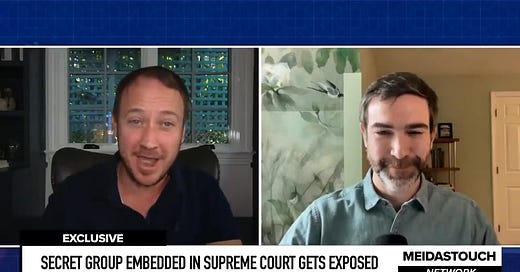In a recent investigation by MeidasTouch hosts Ben Meiselas and Court Accountability’s co-founder and executive director Alex Aronson, an unsettling connection was uncovered between Opus Dei, a secretive Catholic sect formed in 1920s Spain, and MAGA-aligned federal judges in the United States. The investigation traces how Opus Dei, notorious for its hidden agendas and extreme religious practices, has infiltrated America's legal system through key figures like Leonard Leo, a conservative mastermind behind the Federalist Society.
Opus Dei first gained widespread recognition through fictional works like The Da Vinci Code, but as Aronson and Meiselas point out, its real-world influence is far from fiction. The sect, initially formed under the dictatorship of Francisco Franco in Spain, has long sought to embed its far-right Christian ideology into civic life. One of its most successful endeavors has been aligning with Leonard Leo, a name synonymous with right-wing judicial appointments and dark money influence in U.S. politics.
Leo’s role, often overshadowed by public figures like Clarence Thomas and Brett Kavanaugh, is far more insidious than previously thought. By leveraging over $1.6 billion in dark money, Leo has worked to install judges who espouse an extremist, theocratic agenda, including the dismantling of women’s reproductive rights and the erosion of the separation between church and state. Opus Dei’s involvement, as uncovered in Gareth Gore's book Opus: The Cult of Dark Money, Human Trafficking, and Right-Wing Conspiracy Inside the Catholic Church, shows how deeply intertwined these forces have become.
Aronson explains how Opus Dei operates with a dual structure: it includes elite members who live in secretive, self-contained residences and regular, lay members who work within society to influence key sectors such as law and politics. Leonard Leo, closely linked to Opus Dei through Washington, D.C.'s Catholic Information Center, uses his connections to steer judicial decisions that reflect the sect's vision of a far-right, Christian-dominated America.
The investigation paints a chilling picture of how these alliances manifest in the U.S. Supreme Court’s decisions. Overturning Roe v. Wade was just one of many goals of the Opus Dei-Leo network. Their broader agenda includes advancing Christian nationalism, funding organizations that fight against anti-discrimination laws, and even laying the groundwork for a potential national abortion ban under the guise of "fetal personhood."
This secretive yet powerful group wields extraordinary influence behind the scenes, shaping rulings that are pushing the United States toward a theocratic and undemocratic future. As Aronson underscores, unless there’s a concerted effort to expose and dismantle these dark money channels, the U.S. legal system will continue to be a puppet of far-right religious extremism.
In their closing remarks, Meiselas and Aronson encourage viewers to stay informed, amplify these stories, and push for transparency and reform within the judiciary. "We have a moment here," Aronson stresses, "to prevent this far-right Catholic [extremist group] from entrenching itself in our government. But it’s going to take a long-term effort from all of us."
MeidasTouch is thrilled to bring you this important interview ad-free right here on Substack. If you are able to support our work, please consider joining as a paid member today.














Share this post